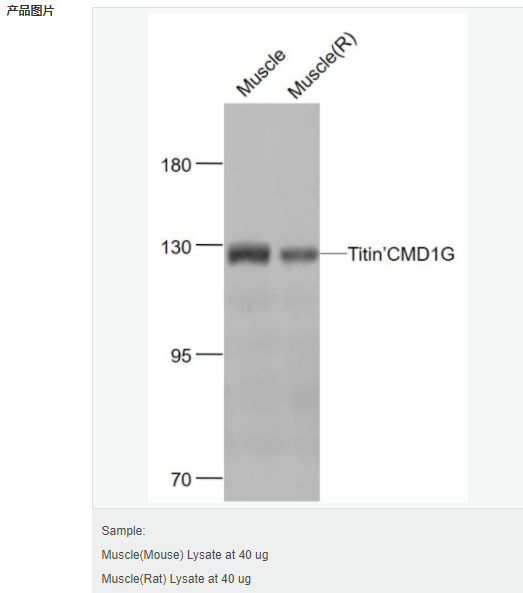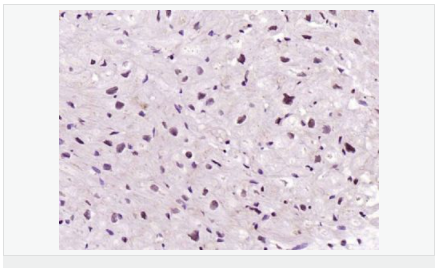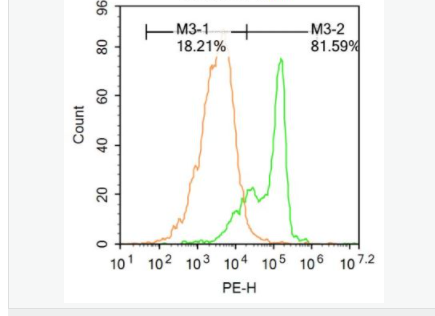

貨號
產(chǎn)品規(guī)格
售價(jià)
備注
BN41970R-50ul
50ul
¥1486.00
交叉反應(yīng):Human(predicted:Mouse,Rat,Pig,Cow) 推薦應(yīng)用:IHC-P,IHC-F,IF,Flow-Cyt,ELISA
BN41970R-100ul
100ul
¥2360.00
交叉反應(yīng):Human(predicted:Mouse,Rat,Pig,Cow) 推薦應(yīng)用:IHC-P,IHC-F,IF,Flow-Cyt,ELISA
BN41970R-200ul
200ul
¥3490.00
交叉反應(yīng):Human(predicted:Mouse,Rat,Pig,Cow) 推薦應(yīng)用:IHC-P,IHC-F,IF,Flow-Cyt,ELISA
產(chǎn)品描述
| 英文名稱 | Titin/CMD1G |
| 中文名稱 | 擴(kuò)張型心肌病蛋白1G抗體 |
| 別 名 | TTN; MPRM; Cardiomyopathy dilated 1G (autosomal dominant); CMD1G; CMH 9; CMH9; CMPD 4; CMPD4; Connectin; DKFZp451N061; EOMFC; HMERF; LGMD2J; MU RMS 40.14; Rhabdomyosarcoma antigen; Rhabdomyosarcoma antigen MU RMS 40.14; Rhabdomyosarcoma antigen MU-RMS-40.14; TITIN_HUMAN; TMD. |
| 研究領(lǐng)域 | 心血管 信號轉(zhuǎn)導(dǎo) 表觀遺傳學(xué) |
| 抗體來源 | Rabbit |
| 克隆類型 | Polyclonal |
| 交叉反應(yīng) | Human, Mouse, Rat, (predicted: Pig, Cow, ) |
| 產(chǎn)品應(yīng)用 | WB=1:500-2000 ELISA=1:5000-10000 IHC-P=1:100-500 IHC-F=1:100-500 Flow-Cyt=1ug/test IF=1:50-200 (石蠟切片需做抗原修復(fù)) not yet tested in other applications. optimal dilutions/concentrations should be determined by the end user. |
| 分 子 量 | 3780kDa |
| 細(xì)胞定位 | 細(xì)胞核 細(xì)胞漿 |
| 性 狀 | Liquid |
| 濃 度 | 1mg/ml |
| 免 疫 原 | KLH conjugated synthetic peptide derived from human Titin/CMD1G:2601-2800/34350 |
| 亞 型 | IgG |
| 純化方法 | affinity purified by Protein A |
| 儲 存 液 | 0.01M TBS(pH7.4) with 1% BSA, 0.03% Proclin300 and 50% Glycerol. |
| 保存條件 | Shipped at 4℃. Store at -20 °C for one year. Avoid repeated freeze/thaw cycles. |
| PubMed | PubMed |
| 產(chǎn)品介紹 | Titin, also known as connectin, is a large protein involved in the temporal and spatial control of the assembly of the highly ordered sarcomeres (contractile units) of striated muscle. In addition to sarcomere assembly Titin also functions to maintain the structural integrity of the contracting myofibrils within the muscle and to organize the machinery for condensation of chromosomes in dividing cells. Titin is a giant protein composed of 27,000 amino acids and contains an autoregulated serine kinase catalytic domain as well as a calcium/calmodulin binding region that are involved in its activation. Activated Titin phosphorylates the muscle protein telethonin, a sarcomeric protein abundant in heart and skeletal muscle, implicating Titin activity in the reorganization of the cytoskeleton during myofibrillogenesis. Function: Key component in the assembly and functioning of vertebrate striated muscles. By providing connections at the level of individual microfilaments, it contributes to the fine balance of forces between the two halves of the sarcomere. The size and extensibility of the cross-links are the main determinants of sarcomere extensibility properties of muscle. In non-muscle cells, seems to play a role in chromosome condensation and chromosome segregation during mitosis. Might link the lamina network to chromatin or nuclear actin, or both during interphase. Subunit: Interacts with MYOM1, MYOM2, tropomyosin and myosin. Interacts with actin, primarily via the PEVK domains and with MYPN (By similarity). Interacts with FHL2, NEB, CRYAB, LMNA/lamin-A and LMNB/lamin-B. Interacts with TCAP/telethonin and/or ANK1 isoform Mu17/ank1.5, via the first two N-terminal immunoglobulin domains. Interacts with TRIM63 and TRIM55, through several domains including immunoglobulin domains 141 and 142. Interacts with ANKRD1, ANKRD2 and ANKRD23, via the region between immunoglobulin domains 77 and 78 and interacts with CAPN3, via immunoglobulin domain 79. Interacts with NBR1 through the protein kinase domain. Interacts with CALM/calmodulin. Isoform 8 interacts with OBSCN isoform 3. Subcellular Location: Cytoplasm. Nucleus. Tissue Specificity: Isoform 3, isoform 7 and isoform 8 are expressed in cardiac muscle. Isoform 4 is expressed in vertebrate skeletal muscle. Isoform 6 is expressed in cardiac tissues. Post-translational modifications: Autophosphorylated. Phosphorylated upon DNA damage, probably by ATM or ATR. Similarity: Belongs to the protein kinase superfamily. CAMK Ser/Thr protein kinase family. Contains 132 fibronectin type-III domains. Contains 152 Ig-like (immunoglobulin-like) domains. Contains 19 Kelch repeats. Contains 1 protein kinase domain. Contains 17 RCC1 repeats. Contains 14 TPR repeats. Contains 15 WD repeats. SWISS: Q8WZ42 Gene ID: 7273 Database links: Entrez Gene: 7273 Human Omim: 188840 Human SwissProt: Q8WZ42 Human Unigene: 134602 Human Important Note: This product as supplied is intended for research use only, not for use in human, therapeutic or diagnostic applications. |


